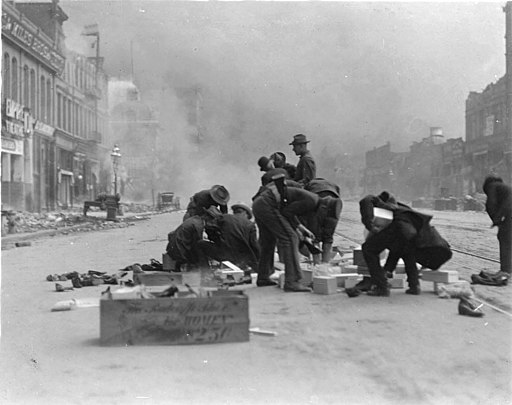Looting is opportunistic theft, often during civil unrest, while plundering involves organized seizing of valuables, typically in warfare.
TL;DR Looting Vs. Plundering
Looting typically refers to the act of stealing or taking possessions from an area during times of chaos or conflict. It is often spontaneous and opportunistic in nature.
Plundering involves systematic pillaging and destruction carried out by a conquering force. Plunderers often have specific targets in mind and employ organized tactics to achieve their goals.
What is looting?

Looting, a term steeped in controversy and often associated with chaos, refers to the act of seizing or stealing valuable items during times of unrest or conflict. It is an age-old practice that has been observed throughout history, from ancient civilizations to modern-day conflicts.
Looting involves individuals or groups taking advantage of chaotic situations to unlawfully acquire possessions that do not belong to them. Whether it’s precious artifacts from archaeological sites or everyday belongings from homes and businesses, looters aim to exploit the vulnerability of others for personal gain.
While looting may seem like a random act carried out by opportunistic individuals, it can also be orchestrated on a larger scale as part of organized crime networks seeking profit through illicit means. In such cases, looting becomes more than just theft; it becomes a systematic enterprise driven by greed and disregard for cultural heritage.
The motives behind looting vary greatly. Some see it as an opportunity for survival in dire circumstances, while others view it purely as an avenue for financial gain. However, regardless of the motivations involved, looting ultimately results in the loss and destruction of irreplaceable historical treasures and cultural artifacts – robbing future generations of their tangible connection to the past.
What is plundering?
What is plundering? Plundering refers to the act of stealing or taking goods, possessions, or resources by force, typically in a time of war or conflict. It involves seizing valuable items for personal gain without regard for the rights or well-being of others.
In history, plundering has been a common practice among invading armies. They would pillage and ransack towns and cities, looting everything they could find. This often resulted in destruction and devastation for the affected communities.
Unlike looting which may involve random acts of theft during times of chaos, plundering is more organized and deliberate. It usually takes place on a larger scale with specific targets in mind. The goal is to accumulate wealth and resources through systematic raids.
Plundering has had significant consequences throughout history. One notable example is the colonization era when European powers exploited colonies by pillaging their natural resources such as gold, silver, spices, and slaves.
Modern-day examples of plundering can be seen in instances where individuals or corporations exploit natural environments for profit without considering the long-term impacts on ecosystems or local communities.
Looting Vs. Plundering – Key differences
| Aspect | Looting | Plundering |
|---|---|---|
| Definition | The act of stealing or pillaging from a location, often during or after a conflict, disaster, or riot. | The act of taking goods or valuables by force, typically as a result of invading or capturing a place. |
| Context | Often associated with civil unrest, riots, or acts of theft during chaotic situations. | Typically associated with warfare, invasions, or the sacking of cities and towns by armed forces. |
| Motivation | Looting is driven by opportunistic theft and personal gain. | Plundering is carried out with the intent to acquire valuable resources or wealth for the benefit of a conquering force. |
| Perpetrators | Looting can be carried out by individuals, small groups, or even mobs without a specific organizational structure. | Plundering is typically conducted by organized military forces or invaders in a coordinated manner. |
| Target | Looting can involve theft from homes, businesses, and public spaces. | Plundering involves taking valuables, resources, or goods from defeated enemies or occupied territories. |
| Legal Status | Generally considered illegal and criminal activity. | Plundering may be viewed as part of the spoils of war, but it is often condemned as a violation of international law. |
| Historical Examples | Looting can occur during riots, civil wars, or natural disasters, and it has been seen in many parts of the world. | Plundering is often associated with historical conquests, such as the looting of Rome by the Visigoths in 410 AD or the pillaging of European cities during medieval warfare. |
Modern Usage of Loot and Plunder
In modern usage, the terms “loot” and “plunder” are still applicable, although they are often used in specific contexts. Here’s how they are used in contemporary language:
Loot
- Burglary and Theft: “Loot” is commonly used to describe stolen items or money, particularly in the context of burglary or theft. For example, “Thieves looted the jewelry store last night.”
- Gaming and Entertainment: In video games and entertainment, “loot” refers to items or rewards that players collect after defeating enemies or completing quests. It can include weapons, armor, currency, and other valuable in-game items.
Plunder
- Environmental Plunder: “Plunder” can be used metaphorically to describe the exploitation or misuse of natural resources or the environment. For instance, “The company’s activities led to the plunder of the local ecosystem.”
- Historical References: The term is also used when discussing historical events or pirate lore. For example, “The pirates plundered the coastal towns in the 18th century.”
- Military Actions: In the context of international conflicts or warfare, “plunder” can describe the act of seizing valuable assets, historical artifacts, or wealth from a defeated nation or region. It may be used in discussions of the consequences of war and the ethics of plundering.
While “loot” and “plunder” may not be used as commonly in everyday language as synonyms for theft or robbery, they remain relevant in various contexts, including gaming, historical references, and discussions of ethical and environmental issues. Their usage often depends on the specific context in which they are employed.
Image Credits
Featured Image By – See page for author, Public domain, via Wikimedia Commons
Image 1 By – Mariama Diallo (VOA), Public domain, via Wikimedia Commons









